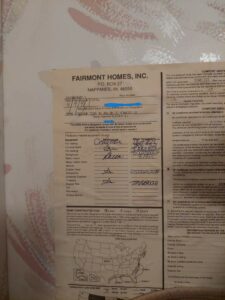Are you trying to sell your motor vehicle? Whether it is an automobile or a mobile home you will need the title. To transfer ownership of the vehicle you will need a clear title. So just what is a clear title? In this article Clear Title Meaning. We will discuss the ins and outs of owning a title to a motor vehicle. We will also look at problems with titles. Problems like: I can’t find my title and there is someone on my title that shouldn’t be.

Clear Title Meaning: The Importance of It
Having a clear title is important. It simply means that you have full ownership of the item that is titled. If you owe against the vehicle then a bank or an individual has an interest in the vehicle. This means they own a part of it with you. Whoever’s name is on the top of the title is the rightful owner of the vehicle.
It would seem if your name is on the title than you own it. However, if there is a lien or loan against the vehicle than the bank does own it in conjunction with you.
How to Know if your Title has a Lien
Under your name on the title, you will see a lien area. If there is a bank mentioned on your title than this would mean that the bank is part owner with you. If you default on the lien or loan, they have a right to the property. When you quit paying on a loan and you default, this process is called foreclosure.
When payments aren’t made typically after 2 to 3 months a bank will start the foreclosure process. This is a slow process, but the bank will eventually gain control of your vehicle that you have a loan on.
Clear Title Meaning: Definition
If you were to look up the definition of a title this is what you would find. In legal terms, a title refers to a document that shows evidence of ownership or legal right to a property, asset, or other valuable item. It is a legal term used to describe the rights to ownership and possession of a property, as well as the documentation that proves those rights. The title may include details such as the property’s legal description, the names of the current and previous owners, any liens or encumbrances, and any other relevant information.
Free and Clear Title
Now if you have a free and clear title you may see a lien on the title but there would be a signature from your bank showing it was released.
You may also have a letter that you received from the bank that you can include with the title. This shows that the loan was paid in full. You typically staple these to the back of the title. This is a lien release.
What happens if you have a title with a lien on it? You know its been paid in full but you have no signature or letter? Well, don’t panic, the first thing you want to do is call your bank. Explain the situation regarding the loan being paid in full. You may need to leave your name and number while they investigate the situation and figure out why the lien has not been released. This can take 24 to 48 hours and a few factors come into play.
Many times, banks get sold repeatedly through the years. This is why you will want to check your titles at least once a year. If you know that you have paid a loan off and you don’t have a release you will want to get this taken care of ASAP. Once a bank gets sold to another owner it can be difficult to track down the records of when the loan was paid in full. Checking your titles once a year will help to make sure your ducks stay in a row.
Clear Title Meaning: Benefits of Having a Clear Title
The main benefit of having a clear title is that whoever has their name on that title owns that titled item free and from any debts. You are the sole owner and you don’t have to get permission from anyone to sell the item. You can legally transfer ownership quickly just by signing your name on the title. When you have a lien on the title you must get the bank to sign off before ownership can be transferred.
You may be interested in knowing How Much is My Mobile Home Worth? This article will help you to figure that out if you are looking to sell the home.
Title Search
Now if you have lost your title and you have no idea who owns your motor vehicle or mobile home there are things you can do to find out. Your best bet would be to go to the nearest Bureau of Motor Vehicle with the vehicle Vin Number. At the bureau they will be able to run the vin number and pull the title to see who is on it. From there you can figure out your next step.
If you are looking for your mobile home Vin Number look for the data plate in the home to start.

Signed Title that was Never Filed
If you have a title from a previous owner and they signed off from the title you will need to take it down and file it in your name. Just take the title to your local Bureau of Motor Vehicle or Secretary of State and they can help you. They are use to dealing with titles and no matter the situation they can point you in the right direction to getting a clear clean title.
What is a Clean Title
Similar to a clear title where there are no liens a clean title means no liens and it is in your legal name only so you can transfer ownership. Again if you have a title that is in the previous owner’s name and they have signed off this is not a clean title. You will need to take the title down to your local motor vehicle bureau and file for a new title.
Tip: Need a new title in your name quickly? You might inquire about a Speedy Title. Many local bureaus now have titles that you can get quick. Just pay a small fee above the duplicate title and it will be there quicker. These titles are sometimes referred to as Speedy Titles.
What Does It Mean to Cure Title?
“Curing title” in real estate refers to the process of resolving any defects or issues that may exist with the ownership records of a property. The goal is to clear any clouds on the title, ensuring that the property has a clean and marketable title. A marketable title is one that is free from legal defects, liens, or other encumbrances that could affect ownership.
Common issues that may need to be cured include:
Outstanding Liens: If there are any unpaid debts or liens on the property, they need to be satisfied or released to clear the title.
Errors in Public Records: Mistakes in public records, such as misspelled names or incorrect property descriptions, can create title issues. Curing title involves correcting these errors.
Missing Heirs or Unresolved Estates: In cases where there are uncertainties about heirs or unresolved estates, actions may need to be taken to clarify ownership.
Unpaid Taxes: Property taxes must be up to date to ensure a clear title. Any unpaid taxes may need to be paid to cure the title.
Unreleased Mortgages: If a previous mortgage or deed of trust was not properly released, it can create a cloud on the title. Clearing these releases is part of curing the title.
The process of curing title typically involves working with a title company or attorney who specializes in real estate transactions. They will conduct a title search to identify any issues and then take the necessary steps to resolve them. Once the title is cured, the property is considered to have a clean title, making it more marketable and transferable. This is an important step in real estate transactions to ensure that the buyer receives clear and unencumbered ownership of the property.

Legal Assistance: Clear Title Meaning
Discovering that you have someone on your title that has passed away, that is incarcerated or has moved away and can’t be found can be a difficult situation. Due to the circumstances, you may need to seek legal advice. A lawyer can advise the legal way to remove these individuals from your title. It may cost you a little bit to get them removed. However, now you will be able to sell your vehicle free and clear.
This is especially the case when you are going through a divorce. Be sure to read our article Sell My Mobile Home
This article will help you when deciding how to sell your mobile home.
Clear Title Meaning: Conclusion
In conclusion having a clear title is important. Having a clear title is the easiest way to sell your vehicle. You want a title so you can sell your motor vehicle free and clear. That also means free and clear from headaches . If you find someone else on your title you know this can cause issues. Be sure to keep your titles in a safe place. Storing them in a fireproof safe is the best place. If you pay off a motor vehicle, be sure to store the payoff letter with the title. This will save you time in the long run.
FAQ’s: Clear Title Meaning
What is the meaning of a clear title?
A clear title refers to a real estate or vehicle title that is free of any legal encumbrances, such as liens, disputes, or claims, ensuring that the property or vehicle can be sold or transferred without any legal hindrances.
Is a clear title good?
Yes, a clear title is generally considered good because it provides assurance to buyers that there are no hidden ownership disputes or financial liabilities associated with the property or vehicle, making it easier to buy, sell, or secure financing.
Is there a difference between clean and clear title?
While the terms are often used interchangeably, a clean title typically means the same as a clear title, indicating the absence of legal issues. However, the specific terminology may vary by region and context.
Who is responsible for removing the lien to clear the title?
The responsibility for removing a lien to clear the title typically falls on the party or individual who placed the lien, usually a creditor. Once the debt or obligation associated with the lien is satisfied, the lienholder should provide the necessary documentation to clear the title, or it may be done through a legal process depending on the circumstances.
